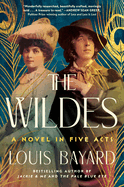
Countless books have been written about the famed Irish playwright Oscar Wilde, but the lasting effects on his family of his 1895 incarceration for then-illegal homosexual acts have garnered less attention. Enter into this vacuum Louis Bayard's The Wildes. Wilde is very much a presence here, but the people being talked about more in this fine work are his family. In the long opening act, set during a summer idyll in 1892 in Norfolk, England, Wilde's wife, Constance, wants to know more about "the chap who's coming tomorrow." That chap is Lord Alfred Douglas, the latest in "the procession of narrow-chested young men, each younger than the last, each astonished by his privilege" whom Oscar has brought home. Constance soon realizes that Lord Alfred is visiting for more than to help her husband translate Salomé from French into English.
After an equally moving second act set in 1897, in which Constance, living under an assumed name, tries to reclaim her life, the remainder of the novel focuses on the couple's sons. In 1915, World War I captain Cyril demonstrates he has learned the hard lesson that "there is no use mourning what is lost." Then, in 1925, son Vyvyan has an uncomfortable reunion with Lord Alfred after a Noël Coward play. Bayard (Jackie & Me) employs the dialogue-rich, my-dear-boy style of writing one might expect from a faithful imagining of Oscar Wilde and the rest of that crowd, and it works well. Those who can't get enough of Wilde and his legacy will welcome this accomplished work. --Michael Magras, freelance book reviewer

